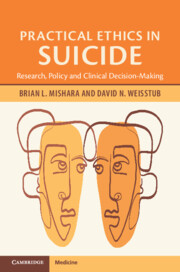Book contents
- Practical Ethics in Suicide
- Practical Ethics in Suicide
- Copyright page
- Contents
- Preface
- Acknowledgements
- 1 Ethical Perspectives to Guide Decision-Making
- 2 Moral Dilemmas in Helpline Rescue Policies
- 3 Ethical Challenges in Suicide Research
- 4 The Control of Suicide Promotion over the Internet
- 5 Genetic Testing for Suicide Risk Assessment
- 6 Suicide and Civil Commitment
- 7 The Legal Status of Suicide
- 8 The Rhetoric of Assisted Suicide and Euthanasia (‘Medical Assistance in Dying’)
- 9 Suicide Prevention and the Expansion of Medical Assistance in Dying
- 10 Conclusion: My Brother’s Keeper
- References
- Index
1 - Ethical Perspectives to Guide Decision-Making
Published online by Cambridge University Press: 15 February 2024
- Practical Ethics in Suicide
- Practical Ethics in Suicide
- Copyright page
- Contents
- Preface
- Acknowledgements
- 1 Ethical Perspectives to Guide Decision-Making
- 2 Moral Dilemmas in Helpline Rescue Policies
- 3 Ethical Challenges in Suicide Research
- 4 The Control of Suicide Promotion over the Internet
- 5 Genetic Testing for Suicide Risk Assessment
- 6 Suicide and Civil Commitment
- 7 The Legal Status of Suicide
- 8 The Rhetoric of Assisted Suicide and Euthanasia (‘Medical Assistance in Dying’)
- 9 Suicide Prevention and the Expansion of Medical Assistance in Dying
- 10 Conclusion: My Brother’s Keeper
- References
- Index
Summary
Ethical perspectives are presented on the acceptability of suicidal behaviours and the obligations and limitations of intervening to prevent suicides intervention. Ethical concerns may influence whether potentially life-saving interventions will be undertaken, and under which circumstances, as well as what is permissible in research studies. We identify three broadly defined ethical positions, recurrent in discourses concerning suicide, which we call moralist, libertarian and relativist. The moralist position contends that suicide is unacceptable and that there is a pervasive moral obligation to protect life that takes precedence in decision-making. Libertarian perspectives emphasise the individual’s freedom of choice to determine whether to live or die, with an absence of an obligation to interfere with the personal decision to die. Relativism refers to the belief that what is morally acceptable varies according to the context or framework of assessment. Stoic views on suicide are contrasted with Jewish, Christian and Moslem perspectives. We discuss if suicide can be rational, if there can be an obligation to suicide, a right to be protected from committing suicide, and Good Samaritan laws.
- Type
- Chapter
- Information
- Practical Ethics in SuicideResearch, Policy and Clinical Decision-Making, pp. 1 - 26Publisher: Cambridge University PressPrint publication year: 2024

